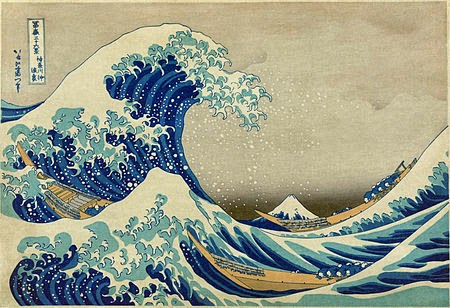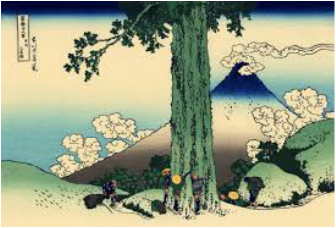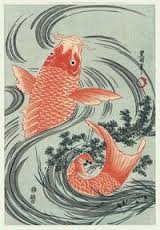JOYFUL MIND WELLBEING
|
Hokusai says look carefully. He says pay attention, notice. He says keep looking, stay curious. Hokusai says says there is no end to seeing Have you noticed a paradox? Sparse expressions can best convey life’s pithy meaning in its depth and width. Hokusai says look carefully. He says pay attention, notice. He says keep looking, stay curious. Hokusai says says there is no end to seeing He says look forward to getting old. He says keep changing, you just get more who you really are. It’s quite magical that words, when used sparingly, carry the power to essentialize their subject, the way an image can. He says get stuck, accept it, repeat yourself as long as it is interesting. He says keep doing what you love. Thus an extraordinary creation resulted when contemporary poet, art historian and curator of Japanese art, Roger Keyes, translated the art of the great Katsushika Hokusai (1760-1849) into language. A professor of East Asian studies in the USA, Keyes reads between the brushstrokes of Hokusai’s extensive oeuvre to pen a beautifully structured poem, “Hokusai Says”. He says keep praying. He says every one of us is a child, every one of us is ancient every one of us has a body. I like to relish the words and read them slowly. It’s like each line is a golden carp darting through a lily pond. One carp, one line. Watching til it disappears and another comes swimming along. .Are you getting a certain sensation in your body from hearing the words? Do they slow you down and take you to a sanctuary within? A welcome place of mindfulness. A google search tells me Keyes wrote his Hokusai poem to console his ailing Japanese wife, Keiko Mizushima Keyes, while he was working away from home. Another layer of meaning and kindness to decorate the carp pond. That was some time ago. Keiko died in 1989 at her home in Woodacre, California. AN AUDIO- VISUAL TREAT! And here’s a really big audio-visual treat! Keye’s “Hokusai” poem has been put to images in a number of You Tube clips. My favourite is read by Meral Mathews, whose mellow voice has a timeless quality, charging the verse with an immediacy that is at once romantic, poignant and convincing. The images used portray Hokusai’s Thirty Six Views of Mt. Fuji, planting the poem firmly in a Japanese woodblock landscape. https://www.youtube.com/watch?v=tVPhuf5zTyE Another version is beautifully read by Mark Williams, one of the founders of Mindfulness-based Cognitive Therapy for depression. The clip aired during the Mindfulness Summit, 31 Days of Mindfulness, a free on-line event devised by Australian duo Melli O’Brien and Matt Dickinson. https://www.youtube.com/watch?v=zkTvAi9UdLw Like it? Share it! I love to hear from readers! Mobile users, click on the blog link to get to the screen where you can leave a comment. Laptop users click on the orange 'Comments' below.
2 Comments
Helen
15/10/2015 07:56:52 pm
Hi Shakti I love the delightful compact fullness of his words.
Reply
Judith Childs
30/4/2017 11:29:25 pm
Hello, Roger. Thank you for this. I looked online and found your deeply considered words at a time when I needed them. Warmest and best thoughts from Judith.
Reply
Leave a Reply. |
Categories
All
Categories
All
|
ServicesYoga Online
Mindfulness Coaching |
|



 RSS Feed
RSS Feed